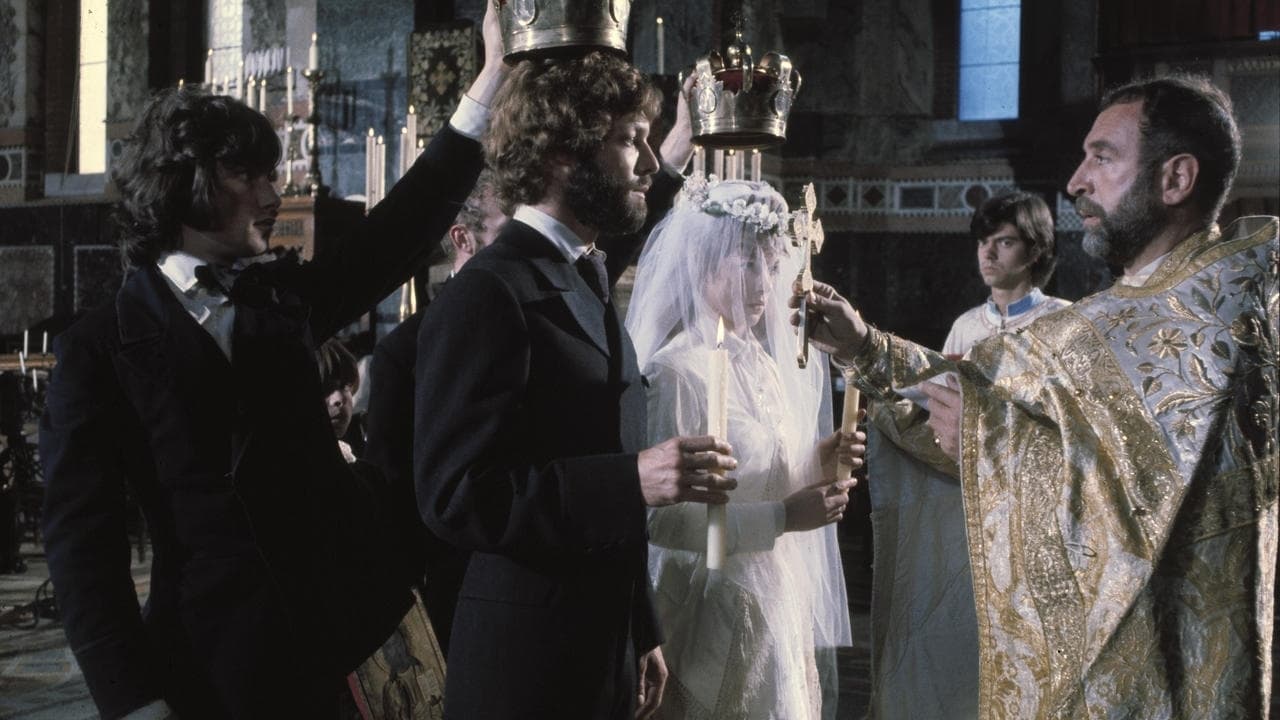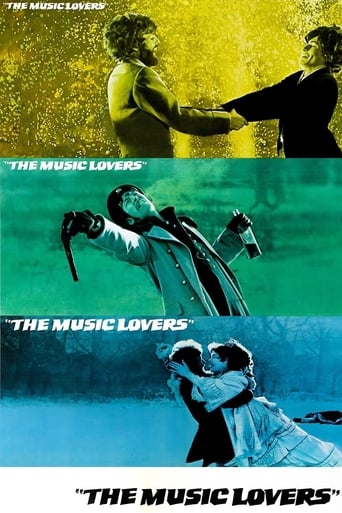

This movie was so-so. It had it's moments, but wasn't the greatest.
... View MoreBlending excellent reporting and strong storytelling, this is a disturbing film truly stranger than fiction
... View MoreBlistering performances.
... View MoreWorth seeing just to witness how winsome it is.
... View MoreWeird , bizarre story of Tchaikovsky's life . Based partially on facts , as Tchaikovsky lived as a bachelor for most of his life . As piano teacher Peter Ilych Tchaikovsky (Richard Chamberlain) is an emotionally insecure man who struggles against his homosexuality . In 1868 he met Belgian soprano Désirée Artôt . They became infatuated with each other and were engaged to be married but due to Artôt's refusal to give up the stage or settle in Russia , the relationship ended . Tchaikovsky later claimed she was the only woman he ever loved . In 1877, at the age of 37 , he wed a former but depressed student , Antonina Miliukova (Glenda Jackson) . The marriage was a disaster . Mismatched psychologically and sexually , the couple lived together for only two and a half months before Tchaikovsky left , overwrought emotionally and suffering from an acute writer's block . Tchaikovsky's marital debacle may have forced him to face the full truth about his sexuality and he never blamed Antonina for the failure of their marriage . Tchaikovsky's family remained supportive of him during this crisis and throughout his life . He was also aided by Nadezhda Von Meck (Izabella Telezynska) , the widow of a railway magnate who had begun contact with him not long before the marriage . As The support of a wealthy widow as a patron gives him the artistic support he needs . As well as an important friend and emotional support , she also became his patroness for the next 13 years , which allowed him to focus exclusively on composition . Tchaikovsky remained abroad for a year after the disintegration of his marriage. During this time, he completed Eugene Onegin , orchestrated his Fourth Symphony and composed the Violin Concerto . The formal Western-oriented teaching he received there set him apart from composers of the contemporary nationalist movement embodied by the Russian composers of The Five (it refers to a circle of composers who met in Saint Petersburg, in the years 1856–1870 : Mily Balakirev , César Cui, Modest Mussorgsky, Nikolai Rimsky-Korsakov and Alexander Borodin), with whom his professional relationship was mixed . He was the first Russian composer whose music made a lasting impression internationally, bolstered by his appearances as a guest conductor in Europe and the United States . Tchaikovsky was honored in 1884 by Emperor Alexander III, and awarded a lifetime pension .This is an intense and thoughtful tale about a thunderous relationship proceeded in a Russel's style . As the film displays his trademarks , extreme angle cameras , excessive facial close-ups, utilization of numerous camera shots with primary colors and overblown visuals . Dealing with the tortuous struggles to have his music accepted as well as Pyotr attempts to suppress his homosexuality , experiencing serious psychological damage . In Ken Russell's own words: ¨It's the story of the marriage between a homosexual and a nymphomaniac that proved to be disastrous¨ . It's a convincing picture though relies heavily on the stormy relationship between Tchaikovsky/Richard Chamberlain and Nina/Glenda Jackson . Magnificent acting with exaggerated but convincing performances . Russell offered Alan Bates the lead role of Tchaikovsky during the filming of Women in love (1969) ; although Bates admired the script he turned the role down . Excellent main cast and secondary actors , such as Kenneth Colley , Bruce Robinson and Max Adrian as Nicholas Rubinstein , among others . Glamorous cinematography with exceptional attention to detail and captivating images by Douglas Slocombe . Spectacular musical score by Andre Previn conducting famous parts as Romeo and Juliet , overture 1812 , miniature march , dance of the clowns , Scherzo burlesque , Manfred Symphony , 6th Symphony , String Quartet No. 3 , Polovtsian Dances from "Prince Igor" by Borodin . The motion picture was well directed with flamboyance style by Ken Rusell . He's an expert director , whose greatest success was in the 70s with an offbeat musical biographies , such as 'Mahler , Lizstomania , Music lovers' , besides he directed another hits , as ¨Women in love¨ , ¨Valentino¨ and ¨The Devils¨. This outlandish biographic chronicle will appeal to Ken Russell fans.
... View MoreBritish director and high-powered madman Ken Russell loves turning biographies on their ear, much to the concern of professional film critics (who believe the filmmaker should show more reverence to his subjects). Although this passionately intense drama about the life of Tchaikovsky begins with a linear story and fully-embodied characters, it doesn't take long for Russell to abandon what are essentially bio-pic pretenses and shoot the works visually. 19th century Russian composer Peter Ilych Tchaikovsky is warned by friends and superiors that his dallying with boys isn't respectable; the gossip gets so heated, Peter decides to marry a fervent female fan who's been writing him adoring letters. Unfortunately, their union is revealed to be a sham on the couple's honeymoon and, despite assurances that she'll be patient, wife Antonina is driven mad by unresolved sexual longing. Russell's film, full of glorious music and eye-popping spectacle, isn't all decadence and debauchery. There's genuine feeling for Glenda Jackson's girlish, naïve Nina, and Richard Chamberlain's conflicted Tchaikovsky is the actor's finest hour on the screen. The film's final reel is a fantastic cinematic rush of fever dreams--not necessarily symbolic, perhaps, and not altogether logical (Nina seems to go stark-raving mad in a short period of time). But one doesn't go to Russell for logic; he gives you food for thought in his technique, while the viewer takes in many potent images that leave a lasting impression. No, this isn't the factual story of Tchaikovsky's turbulent life. It's Ken Russell's turbulence that is on display, and that's fine for some of us. *** from ****
... View MoreAs startling and entertaining a piece of cinema The Music Lovers is, on the whole it will disappoint those who (not unreasonably) may be expecting an accurate (if typically melodramatic) biopic.Rife with inaccuracies, The Music Lovers however occasionally elicits tantalising moments of truth which will be familiar to those who might have studied the great man and his music. The moment of madness during the composition of the violin concerto, Tchaikovsk'y mixing fact and fiction during the composition of Eugene Onegin; (resulting in his disastrous marriage), the brief glimpse of his benefactress during a stay at her apartments, the failed suicide attempt etc etc. However, these fascinating glimpses into well documented occurrences are undeveloped, and in their place we are left with a pastiche either of overly romanticised or histrionic scenes of theatrical fantasy.The real strength here lies in the actor's performances, even Richard Chaimberlain's stuffy and occasionally irritating performance has its moments and Glenda Jackson is wonderful as the vulnerable, unloved wife. The cinematography too is wonderful, evocative and colourful - perfectly in tune with the music of Tchaikovsk'y which also is used to great effect.If you can take Ken Russel's notorious penchant for the ridiculous (and at times, distasteful) and are not expecting the truth, the whole truth and nothing but the truth, then The Music Lovers is worth watching if only for its being so gloriously over the top!
... View MoreFlaming Love, and CholeraSunday October 22, 12:00pm, The Cinerama"Gossip dies without a few facts to support it my friend. Tchaikovsky gives them plenty."The fifth of seven vaguely biographical features based on the lives of prominent composers, The Music Lovers (1970) is director Ken Russell's florid distortion of romantic Russian master, Pyotr Ilyich Tchaikovsky. Throughout his long career, a primary criticism of Russell's work has been that the garish, excessive and vulgar in-your-face style of this former television director is merely amplified on the big screen. Casting one of televisions biggest stars in the title role, production values which have become decidedly dated, and the frequent use of dizzying camera movement do little to contradict this observation. Still, Russell's typically over-the-top portrayal of an artist who struggles with childhood trauma, a difficult (but very unconvincing) temperament and sexual frustration, does have several breathtaking visual moments: The incredible bonfire scene, dancing with the swans, and Nina (Glenda Jackson) ravaged through an iron grate by lunatic asylum inmates. The beautiful score is of course, Tchaikovsky.
... View More